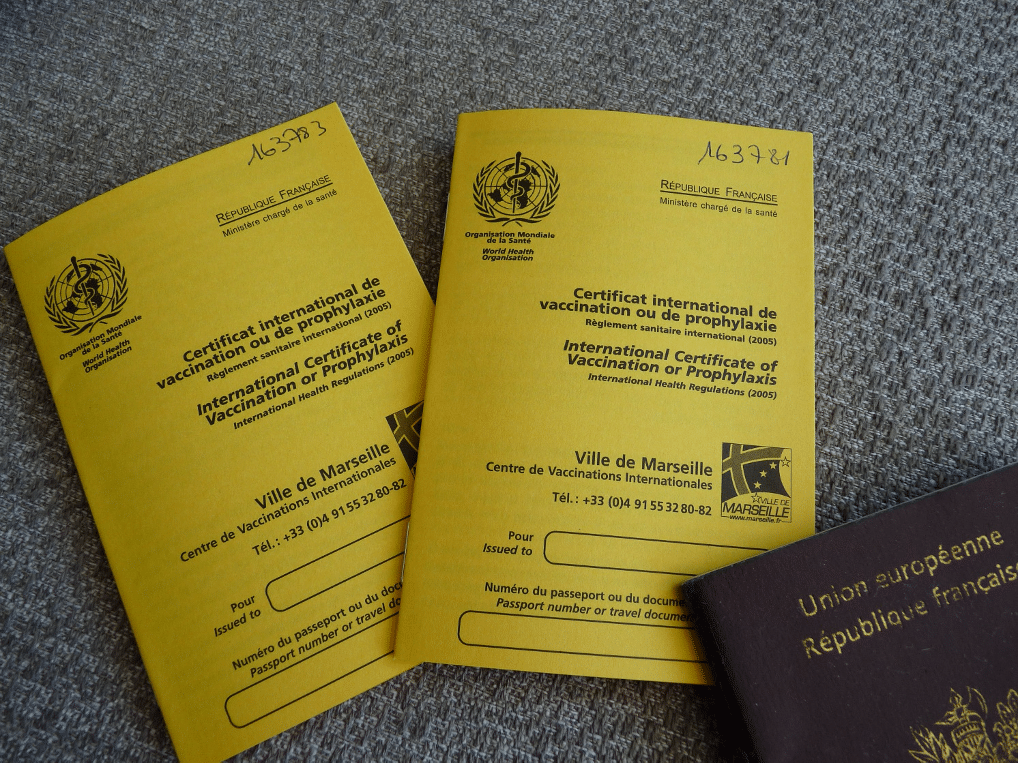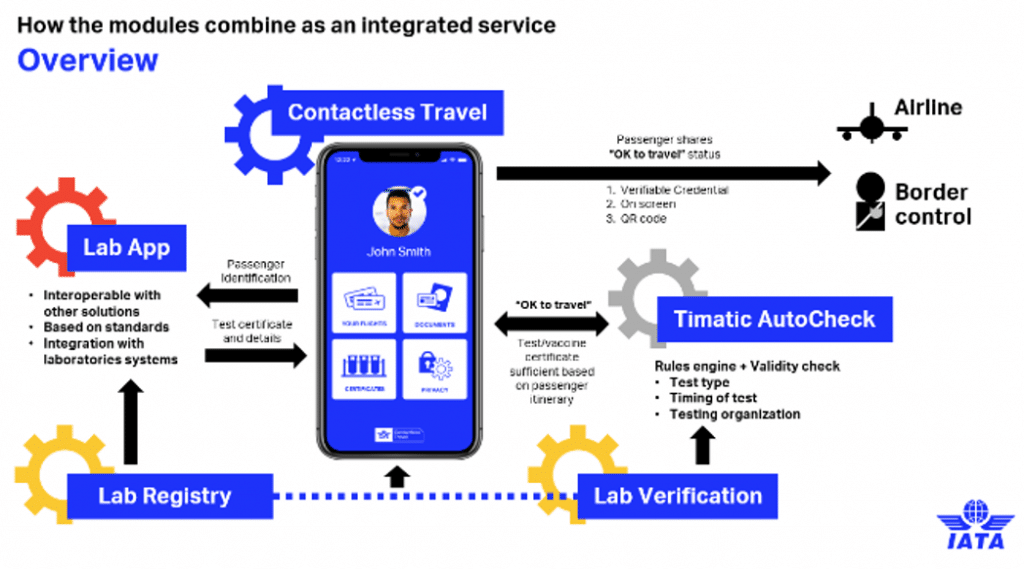IATA is taking a leading role in shaping the post-Covid world of travel. This article outlines what is being proposed to make travel as safe and easy and inexpensive as possible, as the travel industry tries to open up again in 2021. The article outlines who is IATA, and what they are proposing, as well as a likely time schedule on the next steps. It notes other groups proposing similar ‘Apps’. The article is meant to be a general article that informs travelers to all worldwide destinations, not just France. The date of publication is mid-January 2020 and the issues and concerns are changing by the day.

The International Air Transport Association (IATA) is the trade association for the world’s airlines, representing some 290 airlines or 82% of total air traffic. They support many areas of aviation activity and help formulate industry policy on critical aviation issues. Founded in Havana, Cuba in 1945 it is the prime vehicle for inter-airline cooperation in promoting safe, reliable, secure and economical air services – for the benefit of the world’s consumers they say. They aim is to assist airlines by simplifying processes and increasing passenger convenience while reducing costs and improving efficiency.
Over the last decades, the industry has already been rocked by a series of successive crises and shocks (terrorism, pandemic threats, volcanic eruptions, global economic upheavals and an unprecedented rise in the cost price of fuel). All this has made IATA’s leadership more crucial than ever. In 2004 IATA launched an initiative (Simplifying the Business) to use technology to improve customer convenience and reduce costs. In 2008, 100% e-ticketing was achieved, marking a major milestone for the industry. Other industry savings initiatives range from bar-coded boarding passes to Fast Travel, Baggage Improvement Program and e-freight services. After lobbying for the the correct regulatory protection, IATA continued to focus on improvements such as boarding passes on smartphones and the self-tagging of luggage have become commonplace thanks to the Fast Travel project. They are looking to do the same with a Covid-19 response and a tool called TravelPass.
Officially called the International Certificate of Vaccination or Prophylaxis (ICVP), this is an official vaccination record created by the World Health Organization (WHO). It is a kind of ‘medical passport‘ that is recognised internationally and may be required for entry to certain countries where there are increased health risks for travelers. The the yellow colour of the document, and the fact that yellow fever is a commonly required vaccination for travel has contributed to the document’s association with the colour yellow.

One proposal that some governments have suggested, including Chile, Germany, Italy, the UK, and the USA (early on during outbreak in 2020) is the use of immunity passports—ie, digital or physical documents that certify an individual has been infected and is purportedly immune to SARS-CoV-2. Individuals in possession of an immunity passport could be exempt from restrictions and fly. However, immunity passports pose considerable scientific, practical, equitable, and legal challenges. On April 24, 2020, WHO highlighted current knowledge and technical limitations, advising “[t]here is currently no evidence that people who have recovered from COVID-19 and have antibodies are protected from a second infection…[a]t this point in the pandemic, there is not enough evidence about the effectiveness of antibody-mediated immunity to guarantee the accuracy of an ‘immunity passport’”. The Carte Jaune is not an immunity passport; the primary difference is that vaccination certificates such as the Carte Jaune incentives individuals to obtain vaccination against a disease, while immunity passports incentives individuals to get infected with and recover from a disease.
IATA Travel Pass is a mobile application that helps travelers to store and manage their verified certifications for COVID-19 tests or COVID-19 vaccines. This will be important for governments that are likely to require either verified testing or vaccination proof as a condition of international travel during and after the COVID-19 pandemic. The IATA Travel Pass will be more secure and efficient than current paper processes used to manage health requirements (the Yellow Card, for example see above). This will be important given the potentially enormous scale of testing or vaccine verifications that will need to be securely managed.

IATA Travel Pass will help provide governments with the confidence to reopen borders without quarantine. To reopen borders without quarantine, governments need to be confident that they are mitigating the risk of importing COVID-19. IATA Travel Pass will manage and verify the secure flow of necessary testing or vaccine information among governments, airlines, laboratories, and travelers giving governments confidence in a passenger COVID-19 status.
There will be paper-based alternatives for people who do not have mobile phones. And for families, they have formed an industry working group to explore how we can make the process as seamless and efficient as possible.
The first-cross border pilots are expected to start by the end of 2020 (as announced in late November) and the iOS and android launch is slated for early 2021. To be ready for when governments re-open borders, they are working quickly with airlines to bring this to market. To deliver immediate assistance to the industry, the Timatic enhancements for the global registry of health requirements will be available by end of January 2021.
No, governments decide the requirements to travel; airlines and passengers need to comply.
AOKpass is designed, developed and implemented in partnership with the International Chamber of Commerce (ICC), International SOS, and SGS Group. It operates with a test before getting on board, and this test being recorded in a digital AOK pass.
The SGS Group from Switzerland is the world’s leading inspection, verification, testing and certification services company with more than 94,000 employees and a network of more than 2,600 offices and laboratories around the world. AOKpass leverages SGS Group’s extensive international network and facilities to support the AOKpass service. International SOS is the world’s largest medical and travel security services firm, with two-thirds of the Fortune Global 500 companies as clients, 5 million assistance calls every year, 11,000 employees in 1,000 locations in 90 countries worldwide. 1,400 are full-time doctors and 200 are security specialists. AOKpass uses the International SOS Global Assistance Network (GAN) to provide an extensive international network for Accredited Health Providers that can attest to AOKpass digital health certificates. Perhaps one barrier for the AOK pass is that the group is coming from the private sector.
The Commons Project, however has the backing of the World Economic Forum and a broad coalition of public and private partners have collaborated to launch CommonPass, a trusted, globally-interoperable platform for people to document their COVID-19 status (health declarations / PCR tests / vaccinations) to satisfy country entry requirements, while protecting their health data privacy.
So, despite being in the industry we don’t know what will be happening in the next few months but rest assured there are lots of people working with governments and airlines to make travel safe and easy once more. This article has focused mainly on one leading future proposal but also outlined the existing situation, and two alternative proposals. These are all moving towards a workable solution in the very near future that means we can all travel again.
We have adjusted our conditions to be as flexible as possible and allow you to start planning your European adventures now. Ask us for a detailed no-obligation quote.








